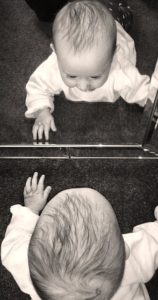Whose Image Do You Bear and Why Does It Matter?
They brought the coin, and [Jesus] asked them, “Whose image is this? And whose inscription?” “Caesar’s,” they replied. Then Jesus said to them, “Give back to Caesar what is Caesar’s and to God what is God’s.”
Mark 12:16-17
 In yesterday’s Life for Leaders devotion, we began reflecting on Mark 12:13-17, a passage that describes a curious dialogue between Jesus and some Jewish leaders. They tried to trap him into saying something that would get him in trouble either with the Roman authorities or with his Jewish followers. The issue was whether or not Jews should pay the imperial tax to Caesar.
In yesterday’s Life for Leaders devotion, we began reflecting on Mark 12:13-17, a passage that describes a curious dialogue between Jesus and some Jewish leaders. They tried to trap him into saying something that would get him in trouble either with the Roman authorities or with his Jewish followers. The issue was whether or not Jews should pay the imperial tax to Caesar.
Jesus’s response confounded his interlocutors. Rather than answering their question, he asked them a question. Holding up a small Roman coin, Jesus asked, “Whose image is this? And whose inscription?” They answered, “Caesar’s” (12:16). In response, Jesus said, “Give back to Caesar what is Caesar’s and to God what is God’s” (12:17).
The Theology of Work commentary on this passage offers insight into what lies beneath Jesus’s obvious reference to the image of Caesar on the coin: “The response of Jesus to the trap revolves around the concepts of image and ownership. Examining the common denarius coin (essentially, a day’s wage), Jesus asks whose “image” (or even “icon”) is upon the coin. The point of the question is probably to allude deliberately to Genesis 1:26-27 (humans made in the image of God) in order to create a contrast. Coins bear the image of the emperor, but humans bear the image of God. Give to the emperor what is his (money), but give to God what is his (our very lives). The core element, that humans bear the imago Dei, is unstated, but it is surely implied by the parallelism built into the logic of the argument.”
What Jesus understood was that human beings bear God’s image, even as Roman coins bear the image of Caesar. We were created in God’s image and likeness, according to Genesis 1:26-27. Scholars debate the nuances of this truth, but the main point is obvious. God created us to be, in key ways, like God. And, as Genesis explains, God created us to act, in key ways, like God. Even as God created all things, so we were created in his image to “Be fruitful and increase in number, fill the earth and subdue it” (Gen 1:28). Just as God is revealed in Genesis 1 as a worker, so we are to be co-workers with God.
Thus, if we are to “Give back to . . . God what is God’s,” namely, our very selves, our whole lives, then we will do this substantially through our work. Remember, this doesn’t mean only the work for which we are paid. Our work includes giving birth to and nurturing children, caring for aging parents, washing the dishes, building homes for the homeless, singing in the choir at church, etc. Yet, for most of us, we give back to God by working faithfully in our occupation, seeking to honor God in all we do. We give back to God what is God’s when we add up a column of numbers correctly, teach math to middle school students, represent a client honestly, start a business that adds value to the world, and lead a corporation to treat its employees with justice and grace. We give back to God what is God’s when we live each moment for his purposes and glory, guided by his truth, empowered by his Spirit, and engaged with his community.
QUESTIONS TO CONSIDER:
If you were to think of your whole life as giving back to God what is God’s, what difference might this make in how you live each day? In how you work? In how you act at home? In what you do with your money? In how you use your time away from work? In how you act when you’re with your friends?
What might you do, practically speaking, to remind yourself that you bear God’s image?
PRAYER:
Gracious God, thank you for creating us in your image. What an incredible honor . . . and responsibility! You have designed us to be like you and to act like you. In particular, you have made us to work, even as you worked in creating the world, and are working still.
Help me, dear Lord, to honor you in my daily work, whatever I’m doing, wherever I am. May I offer my work to you as an expression of worship and gratitude. Use my labors, however modest they may be, for your purposes and glory. May I contribute to the fruitfulness of this world, and to the flourishing of your peace and justice on earth. Amen.
Explore more at the Theology of Work Project online Bible commentary: People are Created in God’s Image (Genesis 1:26, 27; 5:1)


Mark D. Roberts
Senior Strategist
Dr. Mark D. Roberts is a Senior Strategist for Fuller’s Max De Pree Center for Leadership, where he focuses on the spiritual development and thriving of leaders. He is the principal writer of the daily devotional, Life for Leaders,...


